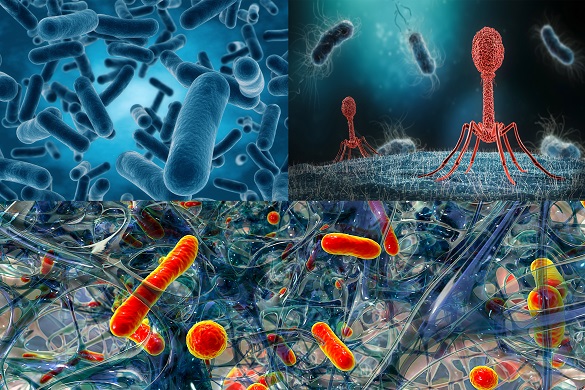University of Liverpool supports innovative businesses in Microbial Technologies

Nine innovative businesses are celebrating receiving £857,000 in funding, from the Innovate UK Biomedical Catalyst feasibility grant, after completing LYVA Labs’ Microbials Accelerator programme – in which the University of Liverpool is a key partner.
Funded as part of the Biomedical Catalyst, the programme consists of a unique package of business support and access to clinical, scientific, technical and commercial advice at no cost to the company. The Microbials Accelerator partnership offers a programme of developmental courses and mentorship opportunities. The programme is designed to give businesses the knowledge and support they need to move products and services from the development stage to market readiness.
The Microbials Accelerator for SMEs developing microbiomes, biofilms, and phage technologies, gave 11 companies business, funding, and mentorship support. Delivered by LYVA Labs and Bionow, with partners including the University of Liverpool, the companies were supported to apply for up to £100k of Innovate UK Biomedical Catalyst feasibility funding.
Nine of the companies that took part in the accelerator secured £857,000 in total, to advance R&D activities and move closer to commercialisation - AMPLY Discovery; BoobyBiome; BugBiome; Ferryx; LightOx; Matrix Bio; Oxford Silk Phage Technologies; Oxford Simcell; and Vitec Microgenix.
The University of Liverpool’s National Biofilm Innovation Centre (NBIC) and Microbiome Innovation Centre (MIC) provide key scientific and translational leadership in Biofilms, Microbiomes and Phage-based approaches.
Professor Rasmita Raval, Co-Director of National Biofilms Innovation Centre said: NBIC is the UK’s single front door for Biofilm research and innovation and has active partnerships with over 200 companies. This programme showcased how complementary Regional Centres of Excellence can be brought together to drive academic-industry partnerships and deliver strong innovation pipelines in this important technology area.
Professor Steve Paterson, Deputy Director of the Microbiome Innovation Centre at the University of Liverpool said: ‘Microbials is a rapidly growing area of Life Science and the University of Liverpool’s Microbiome Innovation Centre is ideally placed in the UK to drive forward translation. It has been really exciting to help create an ecosystem in this area and to work with so many talented and creative innovators.’
Steve Rotheram, Mayor of the Liverpool City Region, said: "Life sciences play an integral role in the delivery of economic growth and job creation across our city region.
“That is why we set up LYVA Labs and allocated £10.5m of funding to help establish an innovation investment approach, with the goal of increasing investment in this sector and creating thousands of new, high-quality jobs.
"It is fantastic to see that, with the support of LYVA Labs, nine innovative SMEs have secured £857,000 in funding, building on the work of our already world leading Innovation Zone.
"This funding will fuel job creation, drive economic growth and ensure local experts lead the way in delivering solutions to global problems."
Reflecting on the programme, Lorna Green, CEO, LYVA Labs commented: “LYVA Labs is delighted to have supported our accelerator companies to apply for Biomedical Catalyst feasibility funding and congratulates all who were successful. We are immensely proud of our Microbials Accelerator. Our collaboration with expert local partners and the dedication of the companies taking part demonstrate the transformative impact that tailored expert support can bring to innovative SMEs. This accelerator has fuelled the growth of microbials-focused ventures and laid the foundation for a vibrant ecosystem where pioneering ideas thrive.”
Geoff Davison, CEO of Bionow, who co-led the programme, added: “We were thrilled to support entrepreneurial SMEs and start-ups to achieve their route to commercialisation and develop the next generation of healthcare products, services, and technologies. There was a real sense of teamwork throughout the process with the sharing of ideas amongst the cohort and the partners.”